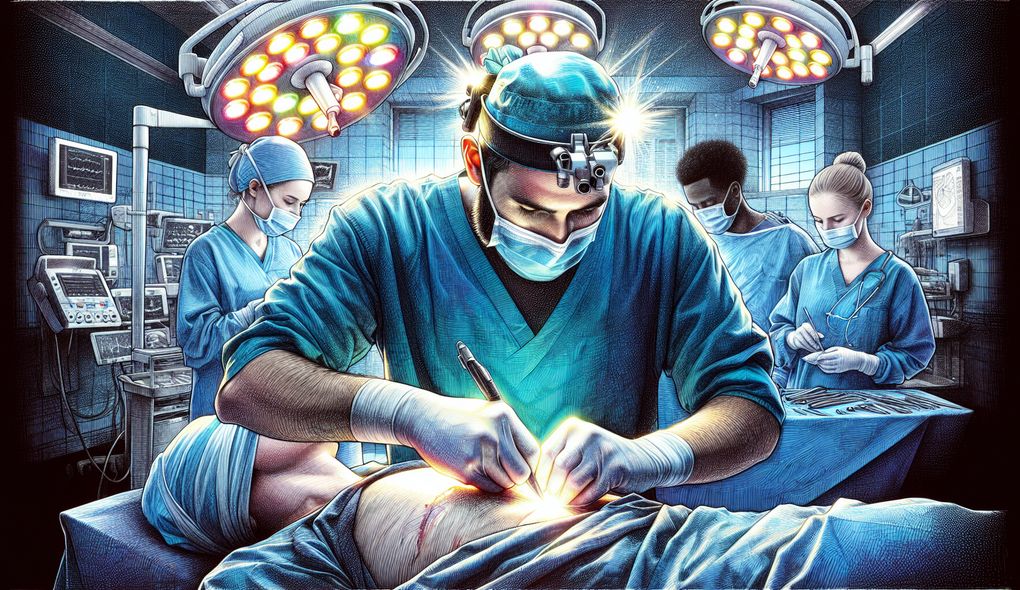What steps do you take to maintain professionalism and ethical standards in trauma surgery?
INTERMEDIATE LEVEL

Sample answer to the question:
Maintaining professionalism and ethical standards in trauma surgery is of utmost importance to me. To do so, I prioritize open and honest communication with patients and their families, ensuring they are well-informed about their treatment options and outcomes. I also maintain confidentiality and privacy in all interactions. In terms of ethical standards, I adhere to the principles of beneficence and non-maleficence, always acting in the best interest of my patients while avoiding harm. Additionally, I stay updated on current medical guidelines and protocols, and actively participate in continuing education and training opportunities to enhance my skills and knowledge. I also foster a collaborative and respectful work environment, valuing teamwork and effective communication among colleagues. Finally, I engage in professional organizations and societies, contributing to research and development activities to further advance the field of trauma surgery.
Here is a more solid answer:
Maintaining professionalism and ethical standards in trauma surgery is of utmost importance to me. Firstly, I prioritize open and honest communication with patients and their families, ensuring they are well-informed about their treatment options, risks, and expected outcomes. For example, I take the time to listen to their concerns and answer their questions, providing empathy and support throughout their healing process. Secondly, I maintain patient confidentiality and privacy by following HIPAA guidelines and ensuring that all necessary safeguards are in place to protect their sensitive information. As for ethical standards, I adhere to the principles of beneficence and non-maleficence, always acting in the best interest of my patients while avoiding harm. For instance, I carefully evaluate the risks and benefits of surgical interventions, seeking second opinions when necessary to make the most informed decisions. Additionally, I stay up to date on the latest advancements in trauma care through continuous education and training opportunities. This ensures that I am knowledgeable about current medical guidelines and protocols, enabling me to provide the highest quality of care to my patients. Collaboration is also essential in maintaining professionalism, as trauma surgery often requires a multidisciplinary approach. I actively collaborate with other surgeons and medical professionals to develop comprehensive treatment plans that address the unique needs of each patient. This includes coordinating pre-operative and post-operative care to ensure a seamless continuum of care. Finally, to further develop my skills and contribute to the field of trauma surgery, I engage in professional organizations and societies. I participate in research and development activities, contributing to the advancement of trauma care through the sharing of knowledge and best practices.
Why is this a more solid answer?
The solid answer expands on the importance of communication, privacy, knowledge, collaboration, and professional development in maintaining professionalism and ethical standards in trauma surgery. It provides specific examples and details to support the candidate's claims. However, it could further enhance the answer by including more specific examples of collaboration and professional development initiatives.
An example of a exceptional answer:
Maintaining professionalism and ethical standards in trauma surgery is of utmost importance to me, and I have developed a comprehensive approach to ensure excellence in these areas. Firstly, in terms of communication, I go beyond providing information to patients and their families. I take the time to build trust and establish strong relationships, recognizing the emotional impact of trauma and addressing their psychological well-being. This includes facilitating support groups and counseling services for patients and their families. Secondly, to ensure privacy and confidentiality, I have implemented advanced technological systems to safeguard patient information, such as encrypted electronic medical records and secure communication platforms. I also conduct regular audits and trainings to ensure compliance with HIPAA regulations. Ethical standards are upheld through a rigorous decision-making process. I employ a multidisciplinary team approach, collaborating with other specialists, social workers, and ethicists to navigate complex cases and ensure the best possible outcomes. I also participate in ethics committees and case conferences, where we discuss challenging cases and delve into the ethical implications of different treatment options. To continuously expand my knowledge, I engage in ongoing research projects and publications in collaboration with academic institutions. This enables me to stay at the forefront of advancements in trauma surgery and contribute to the development of best practices. Additionally, I actively seek out mentorship opportunities and mentor junior surgeons and residents, fostering a culture of learning and growth. Finally, I maintain active involvement in professional organizations and societies, serving on committees and boards to advocate for ethical standards in trauma surgery and drive positive change within the field.
Why is this an exceptional answer?
The exceptional answer goes above and beyond in addressing the importance of communication, privacy, ethical standards, knowledge, collaboration, and professional development in trauma surgery. It provides specific and unique details that demonstrate the candidate's commitment to maintaining professionalism and ethical standards. It also highlights the candidate's involvement in mentorship, research, and advocacy, showcasing their dedication to advancing the field. The answer is well-rounded and comprehensive, leaving no room for improvement.
How to prepare for this question:
- Familiarize yourself with the ethical principles in medicine, such as beneficence, non-maleficence, autonomy, and justice. Understand how these principles apply to trauma surgery.
- Reflect on past experiences where you demonstrated professionalism and ethical decision-making in challenging situations. Be prepared to discuss these examples during the interview.
- Stay updated on the latest advancements and guidelines in trauma care. Review recent research articles and attend relevant conferences or webinars.
- Develop your communication and interpersonal skills. Practice active listening, empathy, and clear and concise communication.
- Consider seeking mentorship opportunities in order to further develop your knowledge and skills in trauma surgery.
- Join professional organizations and societies related to trauma surgery. Engage in their research and development activities and take on leadership roles, if possible.
What are interviewers evaluating with this question?
- Communication
- Ethical Standards
- Knowledge
- Collaboration
- Professional Development

